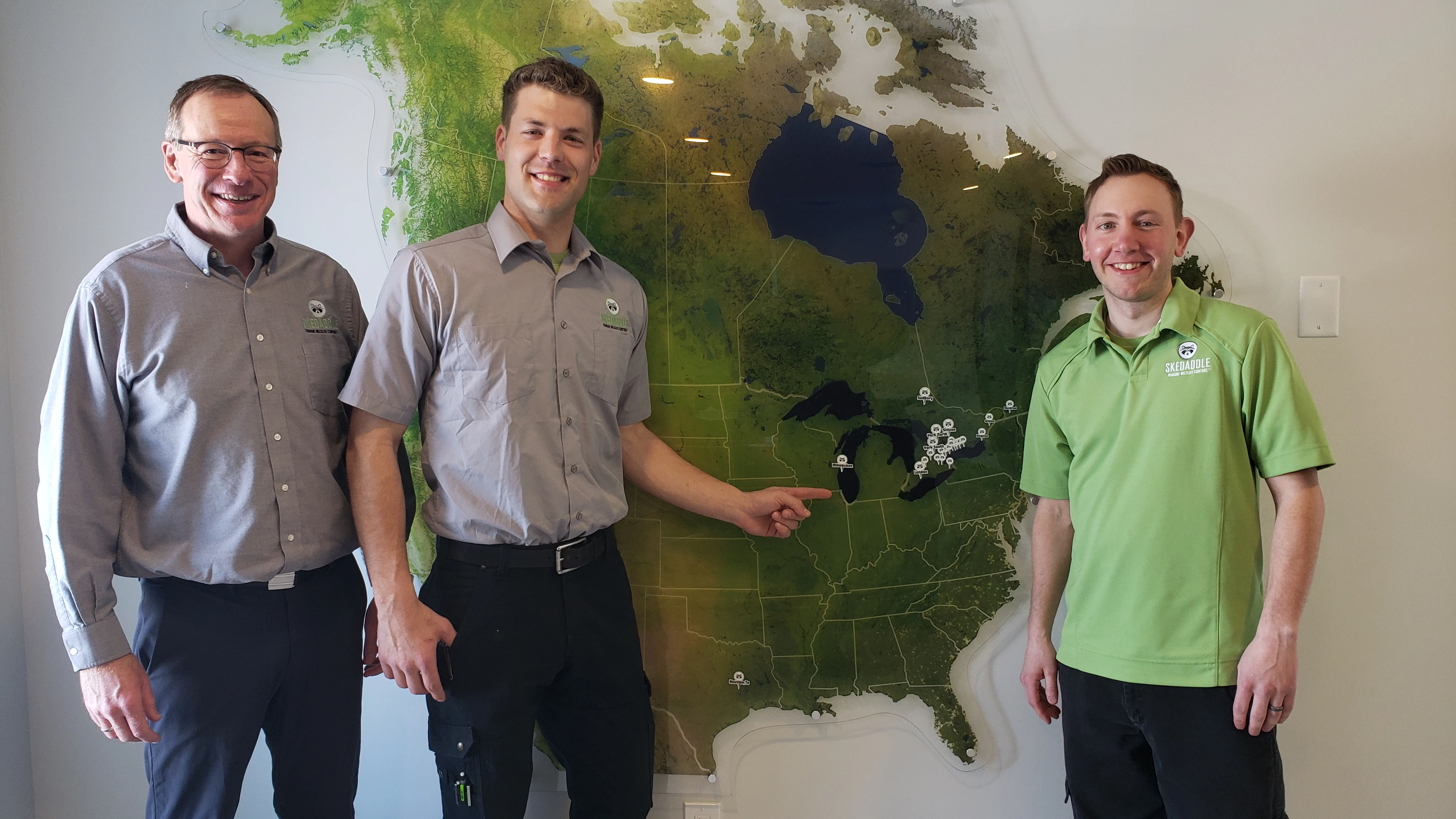
Skedaddle Humane Wildlife Control
HAMILTON, Ontario, – After successfully growing throughout Canada the last 30 years, Skedaddle Humane Wildlife Control, headquartered in Hamilton, Ontario, is setting its sights south of the border via franchising.
Since its founded by Bill Dowd in 1989, Skedaddle has grown to 35 locations across Ontario, British Columbia and Quebec. The first Canadian franchise was in Nova Scotia; its first franchise in the U.S. is in Wisconsin.
Marcus Mueller is the first U.S. franchise operator for the company. He opened his first wildlife operation in Milwaukee, Wis. Dowd said Mueller has seen a 50% increase in

revenue since the business launched.
“You don’t need any information or experience in wildlife to be a franchise operator. … We train on all of that,” he said.
Mueller, for example, has a master of science in wildlife ecology from the University of Wisconsin-Madison, where he studied coyotes and foxes and was “looking for unique, humane business model.”
Mueller recently purchased a second territory in Madison, and is looking to buy the Green Bay market, Dowd said.
“We hire attitude and [teach] skills. If you want to grow something for yourself and family, want a work life balance and are willing to learn, the sky is the limit,” Dowd said. “You must be properly capitalized and have some money to get into owning a business, but we will be able to work with that franchisee and ramp it up quickly.”
Dowd said the company is very “American influenced” since it’s so close to the border and he spent a number of years living in the U.S.
“We feel every city in the U.S. is going to have wildlife issues, whether it’s rats, mice, birds,” he said. “Being close to America here, the Eastern seaboard is a great market around the Great Lakes, it’s a great [franchise] area. And the Pacific Northwest,” also is ripe for franchising.
The company hopes to open five to 10 new locations this year in America, Dowd said.
“I think once we get one location in [say] Cleveland, someone’s going to see our trucks and want to buy another territory,” he said. “We like to take care of the people who are in

our business first.”
THE SKEDADDLE STORY. Skedaddle’s business plan came together in the early 1980s when Dowd pursued hockey for the Ottawa 67 and later the New York Islanders.
“I figured there must be animals in Ottawa, so we went up there and it was a success,” he said. “Every single city we went into, we exploded and couldn’t keep up with the demand for our services.”
Dowd said Skedaddle developed a unique approach to animal treatment where employees are trained on humane and hands-on removal.
“We’re not trapping and relocating animals [like some] companies that just dabble in wildlife and it’s not their main source of revenue,” Dowd said. “We take the approach that it’s not the animal’s [fault], they’re here to stay. The [human] population is increasing, and our sales revenue tends to increase, so the secret is to wildlife-proof your home.”
Marketing has also been a growth driver. Most business in Canada came from customers seeing the green service trucks on the road with large animals on them, said Dowd.
Dowd said there’s opportunities for pest control operators to gain another source of revenue from adding wildlife services to their offerings.
“Our average ticket or price per job, typically falls anywhere from $1,500 to $2,500 versus a spider treatment that might only be a couple hours [of work],” Dowd said. “It would be a great add-on service for any pest operator in America because they already have the service trucks and labor. We're going to teach you how to do wildlife properly.”
The urban wildlife population is continuing to grow. There are 15 to 50 raccoons per square mile in any given town, according to the company’s website.
If dealing with raccoons weren’t already fun enough, Dowd said the company also offers professional Christmas decorating as a revenue stream.
“We don’t sell any of the lights, but we install our lights and take care of them if there are any issues, and we take them down at the end of the year,” Dowd said. “We have a 75% renewal rate on that service.”
Latest from Pest Control Technology
- Donny Oswalt Shares What Makes Termites a 'Tricky' Pest
- Study Finds Fecal Tests Can Reveal Active Termite Infestations
- Peachtree Pest Control Partners with Local Nonprofits to Fight Food Insecurity
- Allergy Technologies, PHA Expand ATAHC Complete Program to Protect 8,500 Homes
- Housecall Pro Hosts '25 Winter Summit Featuring Mike Rowe
- Advanced Education
- Spotted Lanternflies, BMSBs Most Problematic Invasive Pests, Poll Finds
- Ecolab Acquires Guardian Pest Solutions





